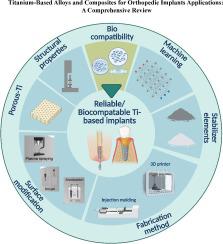当前位置:
X-MOL 学术
›
Mater. Des.
›
论文详情
Our official English website, www.x-mol.net, welcomes your feedback! (Note: you will need to create a separate account there.)
Titanium-Based alloys and composites for orthopedic implants Applications: A comprehensive review
Materials & Design ( IF 8.4 ) Pub Date : 2024-03-13 , DOI: 10.1016/j.matdes.2024.112850 Walaa Abd-Elaziem , Moustafa A. Darwish , Atef Hamada , Walid M. Daoush
Materials & Design ( IF 8.4 ) Pub Date : 2024-03-13 , DOI: 10.1016/j.matdes.2024.112850 Walaa Abd-Elaziem , Moustafa A. Darwish , Atef Hamada , Walid M. Daoush

|
The increasing demand for orthopedic implants has driven the search for materials that combine strength, biocompatibility, and long lifetime. Compared to stainless steel and Co-Cr-based alloys, titanium (Ti) and its alloys are favored for biomedical implants because of their high strength, corrosion resistance, and biocompatibility. This comprehensive review delivers a wide overview of the field of Ti-based biomaterials for orthopedic implants applications, focusing on their types, mechanical and chemical resistance, surface modifications, innovations in fabrication techniques, Ti matrix composites, and machine learning (ML) advancements. Ti alloys of different crystalline phases, including α, near-α, (α + β), β, and shape memory alloys, offer diverse options for orthopedic applications. Strengthening properties, wear, fatigue, and corrosion resistance are crucial factors influencing the performance and reliability of Ti implants. Moreover, this review discussed the challenges to Ti-based biomaterial durability through surface modifications to enhance their biofunction, wear resistance, corrosion resistance, and antibacterial properties. Recent developments in fabrication techniques for Ti-based biomaterials are also discussed. Eventually, this review investigated how ML revolutionized Ti orthopedic implants by providing insights into the behavior of new alloys, aiding in manufacturing optimization, allowing for real-time quality control, and advancing the development of personalized, biocompatible, and reliable implants.
中文翻译:

用于骨科植入物的钛基合金和复合材料应用:全面综述
对骨科植入物的需求不断增长,推动了对兼具强度、生物相容性和长使用寿命的材料的寻找。与不锈钢和钴铬基合金相比,钛(Ti)及其合金因其高强度、耐腐蚀和生物相容性而受到生物医学植入物的青睐。这篇全面的综述对骨科植入物应用的钛基生物材料领域进行了广泛的概述,重点关注其类型、机械和化学耐受性、表面改性、制造技术创新、钛基复合材料和机器学习 (ML) 进步。不同晶相的钛合金,包括α、近α、(α + β)、β和形状记忆合金,为骨科应用提供了多种选择。强化性能、磨损、疲劳和耐腐蚀性是影响钛种植体性能和可靠性的关键因素。此外,这篇综述还讨论了通过表面改性以增强其生物功能、耐磨性、耐腐蚀性和抗菌性能对钛基生物材料耐久性的挑战。还讨论了钛基生物材料制造技术的最新发展。最终,这篇综述研究了机器学习如何通过深入了解新合金的行为、帮助优化制造、实现实时质量控制以及推进个性化、生物相容性和可靠植入物的开发,从而彻底改变钛骨科植入物。
更新日期:2024-03-13
中文翻译:

用于骨科植入物的钛基合金和复合材料应用:全面综述
对骨科植入物的需求不断增长,推动了对兼具强度、生物相容性和长使用寿命的材料的寻找。与不锈钢和钴铬基合金相比,钛(Ti)及其合金因其高强度、耐腐蚀和生物相容性而受到生物医学植入物的青睐。这篇全面的综述对骨科植入物应用的钛基生物材料领域进行了广泛的概述,重点关注其类型、机械和化学耐受性、表面改性、制造技术创新、钛基复合材料和机器学习 (ML) 进步。不同晶相的钛合金,包括α、近α、(α + β)、β和形状记忆合金,为骨科应用提供了多种选择。强化性能、磨损、疲劳和耐腐蚀性是影响钛种植体性能和可靠性的关键因素。此外,这篇综述还讨论了通过表面改性以增强其生物功能、耐磨性、耐腐蚀性和抗菌性能对钛基生物材料耐久性的挑战。还讨论了钛基生物材料制造技术的最新发展。最终,这篇综述研究了机器学习如何通过深入了解新合金的行为、帮助优化制造、实现实时质量控制以及推进个性化、生物相容性和可靠植入物的开发,从而彻底改变钛骨科植入物。



























 京公网安备 11010802027423号
京公网安备 11010802027423号